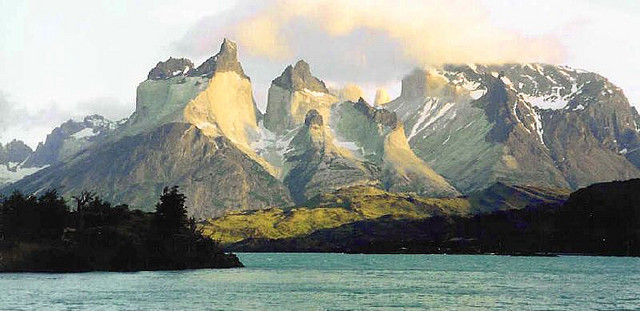Who Should Own '.Patagonia?'
What the fight between a sports gear company and a South American nation says about Internet governance today.

Argentina's "territory" is under threat -- both physically and virtually -- according to its president, Cristina Fernandez de Kirchner. Not only did the residents of the Falkland Islands (or Islas Malvinas) vote overwhelmingly to remain part of Great Britain, but Patagonia, Inc. (the outdoor apparel company) has laid claim to the .patagonia Internet domain.
Resolving Argentina's cyberspace dispute with Patagonia falls to the little known but influential Internet Corporation for Assigned Names and Numbers ("ICANN"). ICANN met this month in Beijing to update its policies and discuss potential additions to the global catalog of domain names, including .patagonia, .amazon, .search, and .book, to name a few.
No single person, company, organization, or other body controls the Internet. What technology can be used online, what goods and services can be sold by whom, and what videos get uploaded to which sites are decided by a combination of civil society groups, governments, inter-governmental organizations, and network operators. This multi-stakeholder model promotes the open flow of information, innovation, and the growth of the Internet.
ICANN will decide who will manage the .patagonia domain (and whether or not to even create it) by following a set of policies that embody the multi-stakeholder model and balance the interests of government, business, and civil society worldwide.
ICANN is a crucial player in international Internet governance because it manages the worldwide allocation of Internet Protocol ("IP") addresses -- the numbers that identify an actual Internet site -- and associated website names within the Domain Name System ("DNS"). ICANN also authorizes domain registries (equivalent to wholesalers), such as Verisign, Inc., to manage generic top-level domain names ("gTLDs"), such as .com, .net, .org, etc. The registry, in turn, works with retailers, known as registrars (such as godaddy.com) to allocate specific domain names (e.g. www.theatlantic.com) to individual consumers.
ICANN was created in 1998 to internationalize management of key aspects of the Internet that were previously overseen by the U.S. government. It receives its formal authority from the Internet Assigned Numbers Authority ("IANA") functions contract with the U.S. Department of Commerce. Today, ICANN is a private non-profit organization headquartered in Marina del Rey, California, and governed by an internationally selected board of directors. It is assisted by several advisory committees and supporting organizations that represent the full range of Internet constituencies - from governments to web companies.
Debate over control of the .patagonia domain arose during ICANN's recent push to authorize new gTLDs to complement the existing ones. Creation of the new domains will allow for greater Internet innovation, increase competition in the registry space, and expand the existing namespace for domain names. ICANN is currently overseeing an application process whereby interested companies and individuals, such as Patagonia, pay an application fee to apply to operate a new gTLD of its choosing. If more than one applicant applies for the same domain, an auction will be held. The application process includes multiple levels of review that ensure all stakeholders, including governments, have a voice in deciding which new gTLDs are assigned and to whom.
At the Beijing Conference, ICANN's Government Advisory Committee -- the principal voice of national governments within the institution -- recommended that ICANN freeze consideration of several gTLDs, including .patagonia and .amazon because certain governments objected to them.
Argentina may face an uphill battle because "Patagonia" does not fall cleanly within the definition of a geographic domain, which would allow Argentina to block Patagonia's application. According to ICANN's guidebook, applicants for geographic gTLDs are required to have the relevant local government's support of their application (or, at least, a lack of objection).
To qualify as a geographic domain, the proposed address must include the name of: a city, a sub-national unit of a country (e.g. a state, county, or province), a UNESCO region name (e.g. a continent or region), or country name. Purchasing .texas or .asia, for instance, would not fly.
According to ICANN's guidelines, it appears that Patagonia Inc. should be able to buy .patagonia. Patagonia has managed the patagonia.com domain and maintained global trademarks for the "Patagonia" without incident. It is a sub-region within Argentina made up of five provinces (that crosses into Chile), but it does not appear on any the lists described above, so it does not appear to violate ICANN standards on geographic domain names. Yet Argentina can still object to ICANN's Geographic Names Panel and ask it to intervene on its behalf. Chile has joined suit, objecting to the granting of the .patagonia domain, too.
Amazon.com, Inc. also attracted attention for its bid for the .amazon domain. None of the countries that form the Amazon basin (e.g. Bolivia, Brazil, Colombia, Ecuador, Peru, or Venezuela) have formally objected yet, but initial indications are that Brazil and Peru likely will. If Brazil were to do so, it would likely be able to block the gTLD from being issued because it has a state named Amazonas, which is very similar to the full domain name being sought by Amazon.com.
ICANN makes policy through a bottom-up, consensus-based processes that includes input from the worldwide Internet community. By working by consensus, ICANN sometimes sacrifices expediency for the sake of inclusiveness and comprehensive deliberation. The openness of ICANN - which allows members of the public to directly address its Board -- stands in sharp contrast to the lack of transparency at the closed meetings of United Nations-affiliated fora that seek to play a role in Internet governance. While cumbersome, the alternative to ICANN's approach -- allowing governments, or another single group, to unilaterally manage the Internet -- risks erosion of Internet freedoms.
Argentina may not prevail in its opposition to Patagonia's application, but it will have a voice in ICANN's deliberations. Whatever the result, ICANN's processes continue to show the benefits of the multi-stakeholder model and its importance to the future of the Internet.